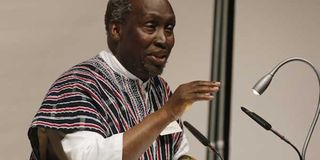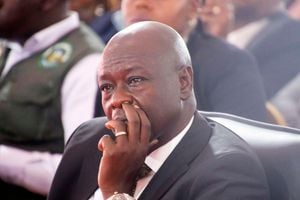Ngugi’s search for answers expressed in his debut novel

Ngugi wa Thiong'o speaks at the University of Bayreuth on May 5, 2014. PHOTO | COURTESY | PETER KOLB
What you need to know:
To honour Ngugi wa Thiong'o, East African Educational Publishers is hosting a variety of events to celebrate the 50th anniversary of the publication of Weep Not, Child.
Weep Not, Child is a multifaceted interrogation of the painful anxieties that gave birth to post-colonial Kenya and its post-colonial subjects.
Ngugi started writing at a time of change and transformation, and more importantly, when no one seemed to know what that change meant. It is precisely this anxiety that seems to powerfully drive his early work.
The novel not only became part and parcel of the quest for education, but it became part of this change, whose possible consequences no one seemed to understand nor comprehend.
After the passing on of Chinua Achebe in 2013, it was not surprising to see street traders snaking between slow-moving vehicles, selling copies of Things Fall Apart on the streets of Lagos and Accra. But it was striking to see that the street traders were also selling copies of Ngugi wa Thiong’o’s Weep Not, Child.
While I am not aware of any instance where Things Fall Apart passed for Weep Not, Child, I know of various incidents where Ngugi has been mistaken for Achebe. On one occasion, at the Jomo Kenyatta International Airport, a stranger came over to Ngugi and heartily thanked him for "writing Things Fall Apart!"
If Things Fall Apart opened up numerous promises for African literature, including the possibilities of using the English language differently, Weep Not, Child “had a profound impact on the culture of letters in East Africa,” especially because of its autobiographical characteristics, which heavily mirrored the experiences of a generation of readers who emerged at the cusp of colonialism and post-colonialism.
Still, one finds a running leitmotif in Achebe’s last book, There Was a Country, and Ngugi’s first novel, Weep Not, Child: Both open and pose difficult questions about memory, citizenship, and lack or loss of it, reminding literary readers and political leaders that what is suppressed always returns to haunt and to destroy.
ELOQUENT VOICE
Ngugi is regarded as one of Africa’s leading writers and one of the most significant post-colonial political, social and cultural thinkers. For more than 50 years, he has been an eloquent voice in championing democratic and human rights.
His series of highly celebrated novels about pre- and post-independent Kenya blend lyricism, a profound sense of place, and meticulous characterisation with uncompromising political and social commentary.
To honour Ngugi, East African Educational Publishers is hosting a variety of events to celebrate the 50th anniversary of the publication of Weep Not, Child.
Published in 1964, Weep Not, Child is a painful expose of the devastating effects of the Mau Mau war: Unspeakable fear that terrorised, chilling suspicion that dehumanised, violence that displaced and destroyed, uncertainty that alienated, suppressed collective memory that haunted, and befuddling change whose inevitability dislocated as it estranged.
In an interview with Dennis Duerden in 1964, Ngugi noted that the Mau Mau war was far more complex than a clamour for the mere materiality of land, especially because the importance of the land transcends “its economic possibilities, it is something almost akin to spiritual.”
KENYAN ANXIETIES
In my interview with Ngugi in 2010, he insisted that there is no “more epic story in the history of our nation than that of the Mau Mau struggles and triumphs”.
Weep Not, Child revolves around the life of Njoroge, a young boy seeking education during the Emergency, which is one of the most violent periods in Kenya’s history. There is violence because land has been taken away by the White man, reducing Njoroge’s father, Ngotho, to a muhoi (tenant at will). But the designs of patriarchy cannot allow Njoroge to understand why his father is a muhoi. The only way to comprehend such complex things is by growing up and becoming educated.
According to Prof Simon Gikandi of Princeton University, one of the leading authorities on Ngugi, it seems the plot can only unfold through Njoroge’s mother, Nyokabi — “the coefficient of optimism” — who carefully intertwines the processes of seeking education and growing up “into a complex knot in which the history of colonialism and African resistance to it is enmeshed with private loss, failure, and mourning”.
Weep Not, Child is a multifaceted interrogation of the painful anxieties that gave birth to post-colonial Kenya and its post-colonial subjects. These anxieties are punctuated with a mixture of dreams of opportunities offered by decolonisation and disillusionment of unfulfilled promises of political independence.
CHANGE AND TRANSFORMATION
Last year, Gikandi organised and chaired a panel on Weep Not, Child at the African Literature Association Conference in Johannesburg. The panelists were key scholars on the work of Ngugu, and they included Prof James Ogude, Prof Susan Kiguli, Prof Mpalive-Hangston Msiska, Dr Wangui wa Goro, and publisher James Currey.
I participated on the panel as Ngugi’s documentary biographer, and screened part of my ongoing project, Ngugi wa Thiong’o: The River Between Indigenous and Colonial Languages.
Discussing Weep Not, Child became an invitation to think of literary careers from their beginnings, and the circumstances that inform these beginnings. Such a reading of Weep Not, Child allowed the panellists to understand Ngugi’s struggles with the anxieties of his beginnings as a writer as well as a post-colonial subject.
Let us remember that Ngugi started writing at a time of change and transformation, and more importantly, when no one seemed to know what that change meant. It is precisely this anxiety that seems to powerfully drive his early work.
What emerged from the vibrant discussion in Johannesburg was the importance of understanding Ngugi’s own location in institutions, and the fundamental role of institutions in his formation as a writer.
Although we see Ngugi graduating from some of the best academic institutions, such as Alliance High School and Makerere University College, it appears he was always marginal, an outsider, in these institutions, which explains the fragility of his beginnings.
AWARENESS OF NOMADISM
By calling attention to the institutions that constructed Ngugi and the importance of these institutions, it is necessary to recognise Ngugi as an institution. According to Gikandi, the generation of readers that emerged at the cusp of colonialism and post-colonialism encountered Weep Not, Child as a set book in schools at a time when the dominant literary narrative was that of a John or a Jane picking daffodils somewhere in Oxford.
Weep Not, Child, therefore, emerged when a certain generation, like Njoroge in the novel, was asking to be educated. The novel not only became part and parcel of this quest for education, but it became part of this change, whose possible consequences no one seemed to understand nor comprehend.
This is the tension we see in Ngugi’s early work, especially because he poses questions that no one seemed able to answer. Gikandi crisply formulates these questions: “What does it mean to be a colonised subject, to organise one’s life and desire according to a set of values that are ultimately going to be frustrated? What does it mean to be educated in the ways of colonialism when this kind of education only leads to an awareness of one’s nomadism, the lack of a stable place of identity in the world?”
Ngugi started responding to these questions in his later work, especially after his encounter with Frantz Fanon’s The Wretched of the Earth.
The writer is an associate professor of journalism and information science and the University of Wisconsin in the United States.




